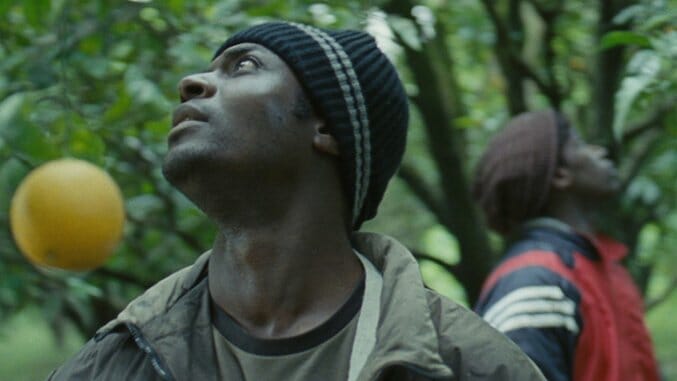
Occasionally, fate and movie release schedules collude with one another to drop a fresh title on audiences at exactly the right moment. That’s more or less the case with Mediterranea, the feature debut of short filmmaker Jonas Carpignano: Check his picture against the United States’ dialogue on immigration, and you may feel the unnerving sense that Fortuna, that fickle Roman deity of destiny and luck, is manipulating some major cosmic marionette strings all while wearing a knowing smirk. The film, of course, has nothing to say about America’s problems with refugees and migrants because it’s oriented around Italy’s own immigration hullabaloos, but Carpignano’s strictly national focus will probably resonate with its U.S. audience regardless.
Such is the nature of empathetic synchronicity. Mediterranea occurs far outside our borders but tells a universal story of hardship, sacrifice and prejudice: If you’re the sort to wonder what it is that drives people to leave their homes to find work in other countries, or even other continents, then think of the film as an educational experience. It’s also personal and authoritative. Carpignano is the son of an Italian father and an African-American mother who has lived between Rome and New York City. There aren’t many people more qualified to tell Mediterranea’s story than that, save, perhaps, for its protagonists.
The film details the journey from Burkina Faso to the Calabrian municipality of Rosarno, anchoring itself to friends Ayiva (Koudous Seihon) and Abas (Alassane Sy). They’ve determined to leave home and make a perilous trek across Northern Africa-Algeria, Tunisia, Libya—to sail across the Mediterranean Sea and land on Italy’s shores. (For anyone with an ear for international incident, their destination should ring an alarming bell.) Ayiva and Abas have a pal in Rosarno who can get them both work. It’s a promise too good to ignore, but on their arrival that promise is immediately tempered by reality. Honest work is hard work, and hard to come by. Worse still, Rosarno’s streets are peppered with xenophobes.
It isn’t all bad, Carpignano assures us. Good, compassionate people embrace Rosarno’s émigré population in the most quintessentially Italian way possible: by welcoming them into their homes and feeding them. The scope Mediterranea offers is impressive, if stilted. Carpignano builds toward a reenactment of 2010 riots in Rosarno involving immigrants and local racists, and his portrait ultimately inclines more toward displays of prejudice than human warmth. That, perhaps, is a necessity, because Mediterranea would be a failure as a mixed bag of perspective. As a quietly furious indictment of supremacism, though, the film cuts deep. Carpignano characterizes virulent bigotry and presents immigrant life with frightening, matter-of-fact ease: Tough guys try to stir up trouble at an evening out at a club, while Ayiva and his compatriots toil in orange groves so they can reside in conditions that rank just above “deplorable.” They’re exploited by powers that don’t give a thought toward their well-being.
Carpignano’s filmmaking isn’t glamorous or showy. In some cases, it’s even a tad flabby, lingering too long on individual shots that overstretch the picture’s connective tissue. But that’s fine. Fearless, precise camerawork more than suffices for the absence of stylization and rigorous editing. So does the fine work of the film’s cast, particularly Seihon, who exhibits quiet, commanding pride and sorrow in his performance as Ayiva. We become attached to him more so than to Abas: The latter man, first slowly then rapidly, adopts a position in the margins of the narrative, which latches onto Ayiva instead. He’s an easygoing, jovial type, and he’s busting his hump for his daughter back home. (No wonder he gets along so easily with children. He’s a dad to his very core.) It’s easy to care for him and fear for his safety in equal measure. But he’s an observer in the stoking of Mediterranea’s social flare-ups as much as Carpignano is an annalist. Ayiva is there to bear witness, and to afford us a chance to bear witness with him.
The film may chronicle events from five years ago that happened five thousand miles away, but Carpignano’s coolly composed depiction of his second homeland’s despicable attitudes toward its emigrant communities is just as timely. (It’s worth noting that it expands on his 2012 short A Chjàna.) Mediterranea is thrilling and terrifying, joyful and heartbreaking, and, despite the time and place of its setting, shockingly relevant. Carpignano’s dedication to capturing societal shame on film makes for an electrifying viewing experience.
Director: Jonas Carpignano
Writer: Jonas Carpignano
Starring: Koudous Seihon, Alassane Sy
Release Date: November 20, 2015
Boston-based critic Andy Crump has been writing online about film since 2009, and has been scribbling for Paste Magazine since 2013. He also contributes to Screen Rant, Movie Mezzanine, and Birth.Movies.Death. You can follow him on Twitter. He is composed of roughly 65 percent Vermont craft brews.